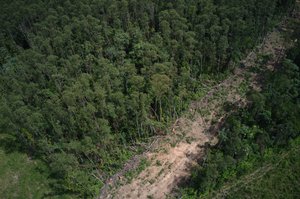As the world’s biggest importer, trillions of dollars’ worth of products from around the globe find their way into the US every year – with the amount of food imports growing in recent years.
According to new analysis provided to us by Trase, US imports of seven everyday commodities were linked to the destruction of 122,800ha of tropical and subtropical forest – equivalent to an area the size of Los Angeles – in just two years.
Imports of palm oil were the most significant contributor, linked to 41,500 hectares of deforestation – and making up more than a third of the US’ total exposure in this analysis. This palm oil was overwhelmingly imported from Indonesia, where deforestation trends have begun to tick back up over the last two years following a decade of decline.
Imports of cattle products were a close second highest, with just under a third (32%) of the US’s total footprint, at 39,100 ha, with exposure concentrated in Brazil, Australia and Mexico. In third place came coffee imports, linked to 29,700 ha – around a quarter (24%) of the total footprint – followed by cocoa (9,320 ha; 7.6%), soya (2,500 ha, 2.0%), corn (459 ha, 0.37%) and rubber (179 ha, 0.15%).
It is important to note that indirect products – like cattle made into leather then imported into the US – were not covered in this analysis.
But the US has an opportunity to stem
the flow of these deforestation-tainted products through the FOREST Act, which
has been waiting in the wings for more than two years.
The FOREST Act
In 2021, the aptly named Fostering Overseas Rule of Law and Environmentally Sound Trade – or FOREST Act – was first introduced to US congress. Since then, other nations around the world have stepped up and passed similar legislation – like the EUDR and the UK Environment Act.
The FOREST Act went through two years of negotiations before being reintroduced in its current form in November 2023 – this time, with bipartisan support in both chambers of Congress. The refreshed FOREST Act of 2023 seeks to prevent certain goods driving illegal deforestation overseas from entering US markets – but ongoing negotiations mean the Act still hasn’t been passed by Congress.
The Act takes a phased approach to deforestation. First, once it’s passed, the Act would empower the US Trade Representative to determine which countries and which goods are at the highest risk for illegal deforestation. Only the countries and products that are designated as “high-risk” will be required to meet the newest regulations in the FOREST Act.
The FOREST Act covers agricultural commodities widely associated with deforestation: palm oil, soybeans, cocoa, cattle, and rubber – with the potential for more commodities, like coffee or corn, to be added at a later stage.
Proving products are deforestation-free can take a few forms, but it would likely include a supply chain traceability program that shines a light on a product’s lifecycle from the point of origin (i.e., the farm or ranch where the good originated) to the time it arrives at US borders. Companies that already have taken steps to reduce deforestation would report on those programs. So long as a company can show their supply chain is deforestation-free, they are still free to trade in the US.

Still arial image of deforestation in the region of Marabá, Pará State, Brazil.
Support for countries to end deforestation
The FOREST Act would also support countries in ending deforestation.
Led by the US Trade Representative, the US would determine which countries are high-risk for deforestation, then subsequently develop national “Action Plans” for those countries.
The plans may include: policy or practices to prevent deforestation; ensuring sufficient capacity to support relevant laws; establishing processes to address previous illegal deforestation; effective monitoring, transparency, and data sharing for land ownership and use, deforestation, and potential impacts to other ecosystems; traceability, transparency, and data sharing for commodity supply chains.
In the bill, national Action Plans serve as the primary method for determining how and where US aid can be channelled to support deforestation-free plans. They will also include a series of benchmarks to consider the effectiveness of the program - and to determine when the deforestation-risk has been mitigated.
Strengthening the FOREST Act
While the Act in its current form could still help to drastically reduce the US’ deforestation footprint, it is comparatively weaker than other similar legislation, such as the EU’s Deforestation Regulation (EUDR) – and could and should go much further in future.
First, the Act could do so much more to centre human rights. In fact, previous versions of the Bill had a stronger focus on community outreach, specifically for Indigenous and other local communities that live in or near the forest – often the best defenders of land. If plans for forest protection don’t actively engage and centre the needs of these communities, we risk the plans becoming ineffective.
The FOREST Act also adopts a “legality standard,” meaning if the deforested land a good or product was grown on has been illegally deforested in the source country, then it would be illegal to import that product into the US.
This approach differs from other import-related regulations like the EUDR that apply to all goods from deforested land regardless of whether this land was deforested legally or illegally. To be fully robust, the FOREST Act should be extended to include products from all deforested land.
The Act also currently only covers agricultural commodities – and not other areas of growing concern, like large-scale mining for transition minerals important to the technology sector. With the current focus on securing a sustainable supply of these products, the US should consider increasing scrutiny into this growing and risky field.
What’s more, the FOREST Act doesn’t cover the financial flows enabling the deforestation-tainted products reaching US consumers. This funding is vast, as our research has shown. It’s therefore vital the funding from US banks that enables these commodities to be grown on deforested land in the first place is fully shut off.
If the US is serious about halting and reversing global forest loss by 2030, Congress must pass the bill in its current form as soon as possible. This would ensure the US can at least slow the tide of certain deforestation-tainted products in the near-term – with a view to filling in the gaps further down the line.
Every day the FOREST Act is delayed results in more destruction of climate-critical tropical forests that the world cannot afford to lose.


